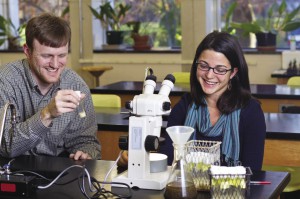
Biology professor Jeffrey Copeland and EMU junior Charise Garber.
Why and how do we get old? This is one of the most basic and unknown questions of biology, says Jeffrey M. Copeland, PhD, assistant professor of biology at EMU.
Joining him to study the topic is junior biology/music double major, Charise Garber of Lancaster, Pa.
“We’re using fruit flies,” explains Garber, “because their genes are easy to manipulate. Fruit flies live relatively short lives and are metabolically similar.”
The fruit fly research builds on Copeland’s post-doctoral work at the University of California, Los Angeles (UCLA) and his doctorate work at the California Institute of Technology.
This kind of study – undergraduates paired with full-PhD level professors doing original research – is typical at EMU and key to the success many graduates report enjoying in graduate and medical school study.
Hearing about this kind of faculty-student interaction from EMU alumni in the Lancaster area, as well as on a campus visit, influenced Garber’s decision to come to EMU.
Copeland considered other options before coming to EMU in the fall of 2010. While still in Los Angeles, Copeland says, he met many alumni who impressed him with their unique perspective and knowledge.
“Part of the thrill of teaching at EMU is being able to have those one-on-one mentoring opportunities that strengthen the educational experience for both teacher and student,” he says.
Of the current theories of aging, Copeland notes that scientists currently have only a naive idea, and “we don’t have a good understanding of the genes controlling the aging process.”
He wants to understand which genes are important and how they relate to the numerous age-related diseases, like Parkinson’s and Alzheimer’s.
“One method to understanding the life of fruit flies is to slightly lower their metabolism, and it is important to determine if lowered metabolism can affect disease models in flies,” Copeland explains.
Garber and Copeland know that lowered metabolism specifically in the brains of flies can extend the lifespan, something Copeland determined in his earlier research at UCLA.
Now the two hope to discover what regions of the brain are affected and in what way. Answering these questions could give scientists everywhere new insights into many illnesses currently plaguing humanity.
— Tim Hartman, Elida, Ohio, a senior liberal arts major with a peacebuilding emphasis, contributed to this article.